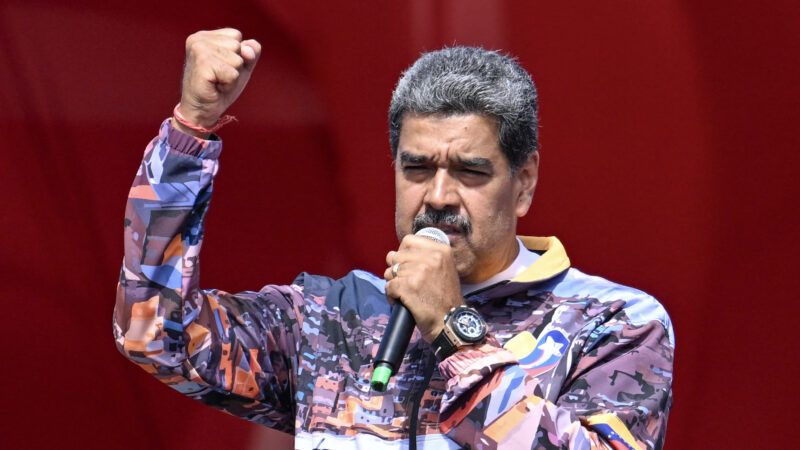Did Nicolás Maduro Just Steal Another Election?
And if the results are proven false, will Venezuela finally move away from authoritarian rule?

The government-controlled electoral authority has declared Nicolás Maduro the winner of Venezuela's presidential election, securing his third consecutive six-year term. But the opposition is crying foul, contending that the authoritarian socialist did not, in fact, receive the most votes.
With 80 percent of the ballots counted, the National Electoral Council (CNE) announced on Monday that Maduro had won 51 percent of the vote while opposition candidate Edmundo González, of the Democratic Unitary Platform, garnered 44 percent.
In his victory speech, Maduro described the results as "a triumph of peace and stability, republican ideals, and the ideas of equality."
But the electoral authority has yet to release the official voting tallies from polling centers. Maduro claims this delay was caused by an unnamed country hacking into the electoral council's system. "The demons and the devils did not want the total to be counted," the Venezuelan leader declared in a statement.
González has countered that the election results are fraudulent, and his party is demanding that the electoral authorities verify the outcome by presenting the tallies issued by the voting machines.
"The Venezuelans and the entire world know what happened," González said at a press conference.
Voting in Venezuela is electronic—voters press a button selecting their preferred candidate on a machine machine, which sends the results to the CNE. Each machine also prints a paper receipt that is placed in a ballot box for potential recounts. The opposition plans to obtain these printed tallies to see if they match the results announced by the CNE.
So far, the opposition has obtained voting tallies from only about 40 percent of the ballot boxes. According to Venezuela's law, independent witnesses are allowed to remain at the polling booths to count paper receipts to prevent tampering and ensure fairness. But opposition members claim they have been denied access and were forcibly removed from the premises.
The CNE has also allegedly halted data transmission from the local polling stations to its headquarters, preventing additional votes from being processed. It remains unclear when the authorities plan to announce the full results.
The opposition claims that González actually won the election, receiving 70 percent of the votes against Maduro's 30 percent.
"We have not only defeated them politically, morally, and spiritually, today we defeated them with our votes in all of Venezuela," opposition leader María Corina Machado, a pro-market politician who Maduro barred from running in the elections, said at the news conference.
World leaders have voiced skepticism about the official results. U.S. Secretary of State Antony Blinken expressed "serious concerns that the result announced does not reflect the will of the Venezuelan people." The European Union's foreign policy chief wrote on X, "Ensuring full transparency in the electoral process, including detailed counting of votes and access to voting records at polling stations, is vital." The sentiment was echoed by several Latin American and European presidents.
Maduro received congratulations from the presidents of Cuba, Honduras, and Bolivia, as well as messages of support from Russia, China, and Iran. Cuban President Miguel Díaz-Canel said "the dignity and bravery of the Venezuelan people had triumphed over pressure and manipulation." Russian President Vladimir Putin put out a statement declaring his confidence that Maduro's "activities at the head of state will continue to contribute to their progressive development in all directions."
This is not the first time Maduro's legitimacy has been questioned. In 2018, then–U.S. Secretary of State Mike Pompeo dismissed Venezuela's vote as a "sham" due to multiple irregularities. The government banned opposition candidates from participating, jailed others, and allegedly intimidated voters. The results led to mass protests and global condemnation.
Maduro, who succeeded Hugo Chávez in 2013, faces drug trafficking and corruption charges in the U.S. and is under investigation by the International Criminal Court for crimes against humanity. Almost 8 million Venezuelans have fled the country amid hyperinflation, shortages of essential goods, and rampant corruption. Many more have expressed their desire to leave if Maduro remains in power.
If the election results announced by the CNE are proven false, it could mark a pivotal moment for Venezuela to move away from authoritarian rule.


Show Comments (118)